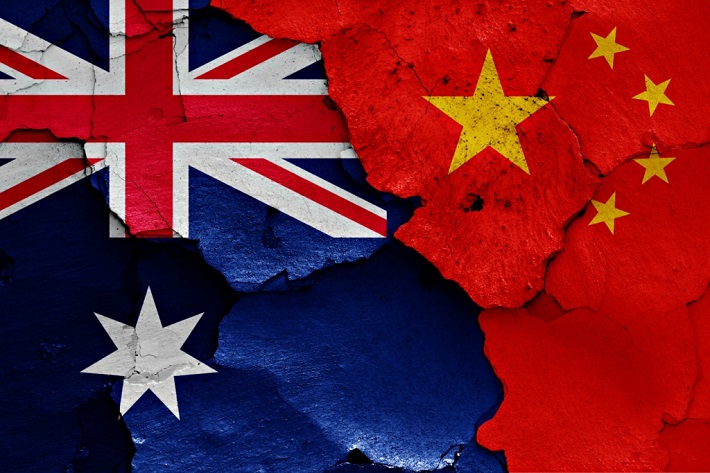


[File photo]
Leading the largest and most significant delegation to visit the U.S. on Thursday, Australian Prime Minister Malcolm Turnbull’s cosying up to the U.S. is in sharp contrast to his unfriendly China policy, especially after a plan of forging a U.S.-Australian alliance that may foil China’s Belt and Road Initiative was revealed right before his departure.
“Turnbull is able to tell Americans that in 12 months he has positioned Australia as the most anti-Chinese of all America’s allies…Australia has jettisoned a consensus on China policy that stretched from diplomatic recognition in 1972 to the decision to join the Asian Infrastructure Investment Bank in 2015,” wrote Bob Carr, a former Australian foreign minister in an article released by South China Morning Post on Monday.
Carr’s comments come after Australian media outlets revealed the country’s plan to establish a joint regional infrastructure project, which includes the U.S., Japan and India. The plan is considered by many experts as an attempt to counter China’s spreading influence, as well as another example of Australia’s hostile gesture towards China.
Though Australian Foreign Minister Julie Bishop, according to Reuters, noted on Monday that "infrastructure initiative need not be at the expense of any other initiative,” the timing of the plan’s release, as well as the candidate countries of the project, have raised doubts among experts, who believe that Turnbull’s visit to the U.S. may propel the plan forward to tackle China’s regional influence.
Bishop’s claim seems to be an unsuccessful attempt to cover up Australia’s conspicuous opposition to the Belt and Road, as her colleague, Australia’s International Development Minister Fierravanti-Well in January openly slammed China’s overseas development assistance in the Pacific, noting that the Chinese were “building a road to nowhere.”
“The Belt and Road Initiative has no exclusiveness, thus there should be no so-called alternative or replacement of the project. If [Australia’s] project is against China’s vision of building a community of a shared future, then it’s not a competition, but a move that runs against the world’s new trend,” Diao Daming, an associate professor of Renmin University, told the Global Times.
Strong as Australia’s intention to build an alliance to counter China’ influence might be, experts noted that there are still many obstacles that can foil its plan.
“Trump administration cannot fulfill allied countries’ economic needs, nor is willing to share the responsibility for their national security. It only hopes Australia to ensure its leading position in the Pacific region, while Japan and India also have different plans, which makes the alliance unstable,” said Diao.
According to Bob Carr, Australia’s pivot away from China is an overreaction and a naïve attempt to fall in line with the U.S. administration’s policies. He also noted that Australia has abandoned 45 years of pragmatic engagement with China in which differences were set aside and the countries worked on positive agendas.
“Many Australians would like a return to a national-interest-based policy of engagement with China. They look forward to a policy correction,” noted Carr.
 Fire brigade in Shanghai holds group wedding
Fire brigade in Shanghai holds group wedding Tourists enjoy ice sculptures in Datan Town, north China
Tourists enjoy ice sculptures in Datan Town, north China Sunset scenery of Dayan Pagoda in Xi'an
Sunset scenery of Dayan Pagoda in Xi'an Tourists have fun at scenic spot in Nanlong Town, NW China
Tourists have fun at scenic spot in Nanlong Town, NW China Harbin attracts tourists by making best use of ice in winter
Harbin attracts tourists by making best use of ice in winter In pics: FIS Alpine Ski Women's World Cup Slalom
In pics: FIS Alpine Ski Women's World Cup Slalom Black-necked cranes rest at reservoir in Lhunzhub County, Lhasa
Black-necked cranes rest at reservoir in Lhunzhub County, Lhasa China's FAST telescope will be available to foreign scientists in April
China's FAST telescope will be available to foreign scientists in April "She power" plays indispensable role in poverty alleviation
"She power" plays indispensable role in poverty alleviation Top 10 world news events of People's Daily in 2020
Top 10 world news events of People's Daily in 2020 Top 10 China news events of People's Daily in 2020
Top 10 China news events of People's Daily in 2020 Top 10 media buzzwords of 2020
Top 10 media buzzwords of 2020 Year-ender:10 major tourism stories of 2020
Year-ender:10 major tourism stories of 2020 No interference in Venezuelan issues
No interference in Venezuelan issues
 Biz prepares for trade spat
Biz prepares for trade spat
 Broadcasting Continent
Broadcasting Continent Australia wins Chinese CEOs as US loses
Australia wins Chinese CEOs as US loses